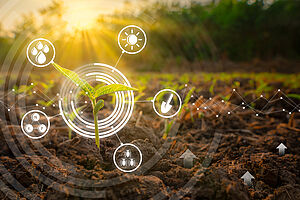Agriculture and the food system are facing major challenges worldwide: Climate change, loss of biodiversity, agricultural pollution and food security are just some of the pressing problems. Sustainable and resource-friendly development of food security is required at international and national levels. In this context, digitalisation and artificial intelligence (AI) offer promising opportunities to address these challenges and facilitate the transformation of agriculture and the food value chain.
A new study by Beatrix Wepner and her colleagues at AIT uses the model region of Lower Austria to show how digitalisation can be used as a lever for transformation. The study was the result of transdisciplinary collaboration between several AIT centres (Innovation Systems & Policy, Digital Safety & Security, Health & Bioresources), which combined their expertise in digitalisation, innovation research and sustainable development to examine the topic from different angles. In a seven-stage foresight process with regional stakeholders from policy, industry and research, five future scenarios were developed to address challenges such as food security, climate change and social justice.
This research contributes to the identification of probable future developments and to the elaboration of widely applicable measures by using foresight methods, which can be implemented with the respective stakeholders in the case study region of Lower Austria. Utilizing the scenario technique helps to facilitate dialogue and identify future options for action and measures fostering innovation and research in addressing emerging challenges at the regional level. The findings provide insights for tackling the challenges of complex agri-food systems in deciding which issues to prioritize for transformation, encompassing policy, finance, education, and digital skills, with digitalisation as leverage point and sustainability as a key concern.



